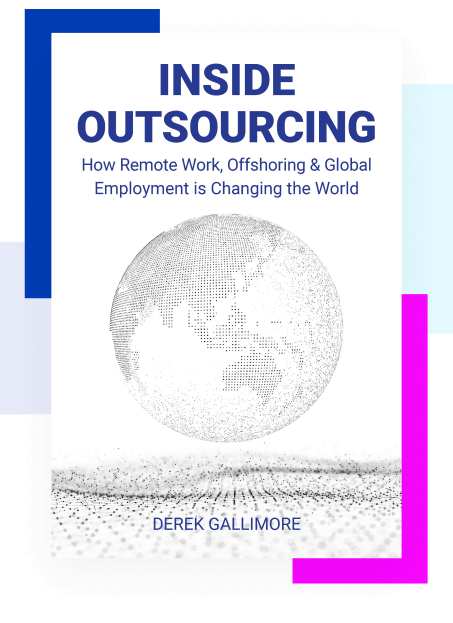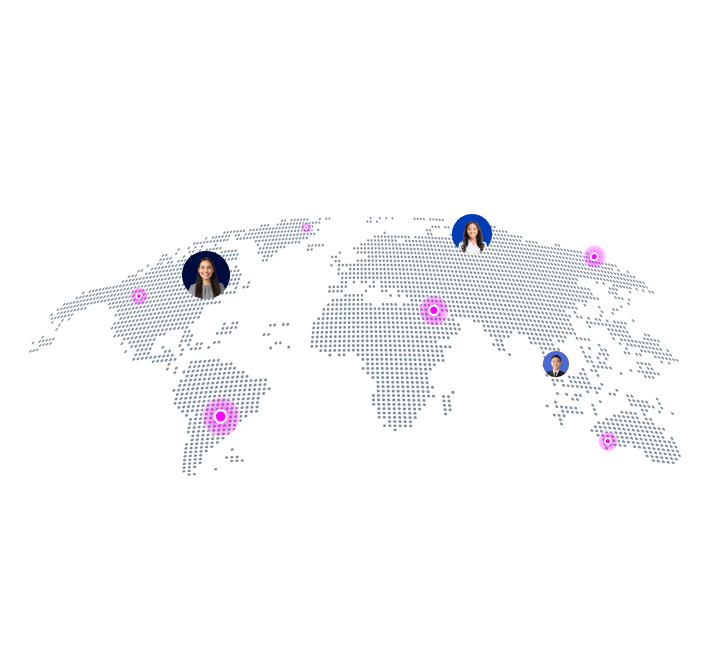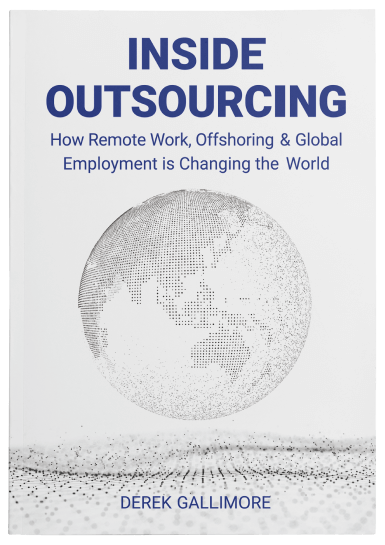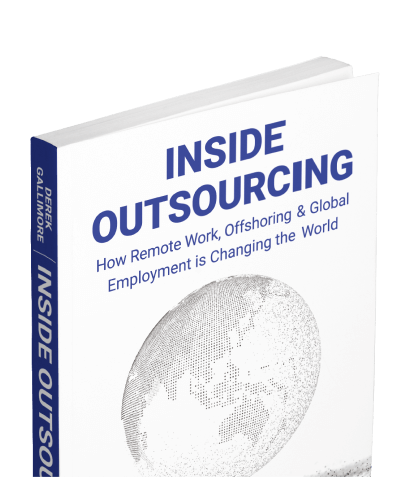Inside Outsourcing
How Remote Work, Outsourcing & Global Employment is Changing the World
GET YOUR COPY
“If you deprive yourself of outsourcing and your competitors do not, you’re putting yourself out of business.”

Lee Kuan Yew
Former Prime Minister of Singapore“…It’s in society’s best interests to have the most output produced with the least inputs.”

Warren Buffet
Investor and world’s wealthiest man“Do what you do best, and outsource the rest.”

Peter Drucker
Management consultant, educator, and authorThe bad boy of business
Outsourcing is the bad boy of business. Blamed for poor quality, unethical salaries, inhumane conditions, and even the ruination of the industrialized economies. Yet, Apple, Google, JP Morgan, and almost every Fortune 500 company outsources, and the industry is growing at breakneck speed.
Hiring an offshore team can save a company 70% on its staffing costs, and offer previously unimaginable access to a near-infinite pool of 2 billion highly-qualified professionals. There are many millions of people who speak fantastic English, have a college degree, and will gladly work for a salary of $500 per month. It’s a game-changing proposition for businesses.
For three decades, the outsourcing industry was a sleeping giant, generating $100 billion annually, and employing tens of millions of people, but mostly invisible to the traditional economy. Now, the giant is waking.

Employment’s new normal
With COVID-induced remote work norms, technological progress, and broad adoption of digital interfaces and online tools, offshore staffing is quickly transitioning from obscure to mainstream. Options of remote, distributed, digital nomads, virtual assistants, freelancers, online-gig-workers, offshore staff, and call centers - are all a part of a new globalized, geographically unrestricted, way of working.
In the last two years, 800 million people have accessed the internet for the first time ever. There are 3 billion others, who are soon to follow. While the original users of the internet are mostly consumers from the developed economies, these newer entrants are increasingly the workers. The internet is connecting the world’s 8 billion people into one single online economy. This shift will have far-reaching consequences, for the economic status quo.
Only recently has outsourcing become an option for small and medium-sized businesses. Previously, due to technological limitations, it was the exclusive domain of the big multi-national conglomerates. Many smaller businesses have now heard of offshoring, but few really understand its full potential or how it can be applied to their company.
Employment’s new normal
With COVID-induced remote work norms, technological progress, and broad adoption of digital interfaces and online tools, offshore staffing is quickly transitioning from obscure to mainstream. Options of remote, distributed, digital nomads, virtual assistants, freelancers, online-gig-workers, offshore staff, and call centers - are all a part of a new globalized, geographically unrestricted, way of working.
In the last two years, 800 million people have accessed the internet for the first time ever. There are 3 billion others, who are soon to follow. While the original users of the internet are mostly consumers from the developed economies, these newer entrants are increasingly the workers. The internet is connecting the world’s 8 billion people into one single online economy. This shift will have far-reaching consequences, for the economic status quo.
Only recently has outsourcing become an option for small and medium-sized businesses. Previously, due to technological limitations, it was the exclusive domain of the big multi-national conglomerates. Many smaller businesses have now heard of offshoring, but few really understand its full potential or how it can be applied to their company.

Brave new world
The trend of globalized employment has only just begun, and will likely not stop until there is a complete amalgamation of the world’s workforce. Governments previously limited worker migration through border controls, but the move towards online work renders borders increasingly irrelevant and governments powerless.
What does it all mean for the typical business, entrepreneur, or manager? Should they embrace this movement, or run from it?
Is outsourcing really the devil incarnate? Or a misunderstood force for good? Will it cause the downfall of economic stability in the West, or catalyze humanity’s next step-change in prosperity and innovation?
Outsourced! takes a deep dive into the origin of outsourcing, its current state, and likely future. It explores the high-level concept, drills down into the mechanics, offers clear insights for its practical application, and provides actionable advice for businesses of all sizes exploring its potential.

About Derek Gallimore
Derek Gallimore is a lifelong entrepreneur and global citizen. He built a multi-million dollar property portfolio and bootstrapped his first business to $20 million revenues in his 20’s, and went on to create the world’s leading outsourcing marketplace, Outsource Accelerator.
Derek has lived and worked in five countries, travelled through dozens more, and embodied remote, online and global work since 2005. He has been outsourcing to the Philippine since 2011, and move to its capital city Manila, in 2014. He believes that outsourcing is one of the most potent and transformative business tools available today, and is a leading proponent for the future of work and the eventual migration to a single global economy.

“The important thing about outsourcing or global sourcing is that it becomes a very powerful tool to leverage talent, improve productivity and reduce work cycles.”

Azim Premji
Indian billionaire businessman“There are people I have outsourced to in India who now outsource portions of their work to the Philippines. It’s the efficient use of capital, and if you want the rewards of a free market, if you want to enjoy the rewards of the capitalist system, these are the rules by which you play.”

Tim Ferris
American investor, author, and podcaster“In the long run, outsourcing is another form of trade that benefits the U.S. economy by giving us cheaper ways to do things."

Janet Yellen
American economistInside Outsourcing
How Remote Work, Outsourcing & Global Employment is Changing the World

How this book is organized
This book is split into four parts, where we work from broad concepts to higher-level theory, and eventually down into actionable tactics and takeaways.
PART 1: Context
Business - past, present, and future
Explore humankind's development of cooperation, division of labor, and specialization throughout the ages. Understand how expanding networks generate exponential leaps in productivity and witness the earliest known examples of trade, outsourcing, and globalization.
PART 2: Concept
About outsourcing
Understand the evolution of employment and the specialization of service provision around the globe. Accurately define what 'outsourcing' really means and uncover how the $250bn-sleeping-giant outsourcing industry has evolved. Learn how to navigate the sector efficiently, understand how it works, and how your business can benefit.
PART 3: Strategy
Evaluating outsourcing
An examination of the industry's controversies, failings, and pros and cons, including a no holds barred analysis of the ethical accusations of outsourcing 'stealing jobs,' ruining economies, and exploiting underprivileged people. Inside Outsourcing provides an in-depth commentary of over 25 outsourcing controversies.
PART 4: Application
Outsourcing in practice
Understand how offshore staffing can transform your business and the best way to set up and manage a team while avoiding the all-too-common disappointments. Inside Outsourcing offers actionable strategies and straightforward tactics to navigate, build and succeed within the new global economy.

